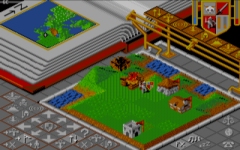Populous (video game)
Populous is a computer game developed by Bullfrog in 1989 and is regarded by many as being the seminal god game. In 1991, Populous won the Origins Award for Best Military or Strategy Computer Game of 1990 as well as 1990 Computer Game of the Year in American video game magazine Video Games & Computer Entertainment. It was the first game in the Populous series. It preceded Populous II and Populous: The Beginning.
In this game, first developed for the Amiga, Atari ST and PC, the player adopts the role of a deity and assumes the responsibility to shepherd people by direction, manipulation, and divine intervention. The player has the ability to shape the landscape and grow their civilization with the overall aim of having it conquer an enemy force, which is led by an opposing deity.
As the game progresses, the player rules over a variety of different civilizations, including Prehistoric, Ancient, and Medieval.
Populous was possibly one of the first games to use a non-linear level progression: the score for each game was calculated from the game statistics, for example the number of towns, the number of successful battles etc. Depending on the score the player could progress to a different world or level and quite typically jump five to ten levels forward each time. This fact suggests that published lists (see in external links) with the entire codes for all levels were obtained by manipulation of the program rather than genuine playing.
Populous was extremely successful and spawned a number of sequels of increasing complexity. It was also released on the PC Engine (as both a HuCard and a CD-ROM), SNES, the Sega Mega Drive/Sega Genesis, the Sega Master System, Sharp's X68000computer and the Acorn Archimedes. An expansion pack called Populous: The Promised Lands was made available, which added five new types of landscape. In addition, another expansion disk called Populous: The Final Frontier added a single new landscape-type and was released as a cover disk for The One. A world editor for Populous called Populous Graphics Editor for the Amiga developed by a third party was also made available [1].
Peter Molyneux led development and mentioned in an interview that the reason the player could manipulate terrain was that he was too lazy to design the many pre-defined maps that would have otherwise been required. The 2001 game Black & White, also led by Molyneux (but this time at his company Lionhead Studios), has been called the "spiritual descendant of Populous."
Peter Molyneux actually got motion sickness from the isometric view. At the time, he decided the isometric was necessary, but he could not play his own game. Bullfrog created a special cartridge for him to play top down only.[citation needed]

